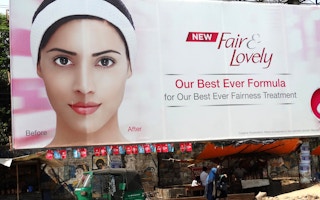Personal care brand Dove found itself in hot water on Monday for an advertisement widely criticised as racist. In a video published on Facebook, a black woman is portrayed as morphing into a white one, with the body wash prominently positioned in the foreground.
To continue reading, subscribe to Eco‑Business.
There's something for everyone. We offer a range of subscription plans.
- Access our stories and receive our Insights Weekly newsletter with the free EB Member plan.
- Unlock unlimited access to our content and archive with EB Circle.
- Publish your content with EB Premium.
The firm swiftly put out a statement saying it “deeply regret(s) the offence” it caused, and that “the video was intended to convey that Dove body wash is for every woman and be a celebration of diversity”. It added that it is revaluating its internal processes for creating and approving content to prevent similar mistakes in the future.
While assembling a more diverse team of decision-makers will likely help Dove avoid such a mis-step in the future, this scandal around skin colour has opened up a much bigger ethical and strategic dilemma for its parent company, Unilever.
Should a company with an avowed mission to be a leader in sustainable and responsible business be selling products that tell people—usually, women—that they need to be fairer than they naturally are?
Several products in the Anglo-Dutch consumer giant’s global portfolio have skin whitening or fairness properties, the most notable one being a fairness cream called Fair & Lovely.
Sold in the company’s Asian, Middle Eastern, and African markets, Fair & Lovely was developed in 1975 and has over the years been marketed as a solution that apparently helps women find the man of their dreams, get noticed professionally, and bafflingly, develop the confidence to resist pressure to get married.
The Facebook advertisement that sparked a wave of criticism and racism accusations for Dove.
Most of Fair & Lovely’s advertisements feature anxious young women gazing into a mirror and disliking what they see; a well-meaning relative then hands them a tube of whitening cream, and using it magically unlocks love, career growth, and happiness for these women.
Of course, Unilever isn’t the only company to sell fairness products. Cosmetics industries in East Asian countries like South Korea and Taiwan have extensive ranges of skin-whitening goods that are not limited to creams; they also include pills and even surgery.
Unilever’s competitor P&G also sells an extensive range of whitening products through its Olay brand, while Korean brands such as Laneige, Sulwhasoo and Mizon all sell similar creams.
To be clear, it’s not acceptable for any company to market products to women by preying on the idea that a dark complexion is somehow inferior to fair skin.
All these brands warrant greater public scrutiny about the message they are sending to young women, and each of them should challenge the cultural norm that fairer is better in their markets.
But for a company like Unilever, perpetuating this ideology is especially risky because it undermines its reputation as corporate leader in the global effort to achieve the United Nations’ Sustainable Development Goals (SDGs); this is an image it has spent many years, and a lot of resources, building up.
Unilever’s SDG journey
The SDGs are a set of 17 goals adopted by the United Nation members in September 2015. They define the world’s development agenda till 2030, and aim to achieve outcomes such as gender equality, health and well-being, peace and justice, as well as the end of hunger, poverty and inequality.
Unilever has been deeply invested in these goals from day one. Its chief executive officer Paul Polman served on the UN’s consultation committee to decide the goals, and has been a staunch advocate for business alignment with the goals in the corporate community for many years.
In 2010, the company launched the Unilever Sustainable Living Plan (USLP) to make, and track, progress towards these goals. These are: To improve health and well-being for more than 1 billion people by 2020, to halve Unilever’s environmental impact by 2030, and to enhance livelihoods for millions by 2020.
Unilever’s efforts to deliver this plan range from launching hand-washing education campaigns alongside soap brands to sourcing all agricultural raw materials sustainability, to providing opportunities for women in management positions in the workplace.
The company reports that it has made “great progress” on its USLP since its launch, and that the 18 products that have been marketed as “Sustainable Living Brands”—Ben & Jerry’s ice cream and Lifebuoy soap, for example—are faring much better than the rest of Unilever’s portfolio.
Dove, too, is a Sustainable Living Brand. It certainly missed the mark with its recent advertisement, but its broader marketing efforts have been generally well-received, and promote the idea that everyone is beautiful, regardless of age, race, or body shape. The company also runs a “Self Esteem Project”, a set of resources for parents, teachers, and mentors to talk to young girls about body confidence.
“
Unilever cannot ride the goodwill that Dove’s marketing generates while simultaneously peddling a fairness cream under a different brand; it is confusing at best, and hypocritical at worst.
Not fair, and not lovely
While there have been some valid feminist critiques about Dove’s emphasis on beauty and empowerment through consumerism, Dove and Unilever’s other Sustainable Living Brands have, by and large, lived up to the spirit of the Sustainable Development Goals.
But products such as Fair & Lovely contravene the goals on several counts. Goal 5, for instance, aims to empower all women and girls.
While Fair & Lovely ostensibly wants to “give women the confidence to overcome their own hesitations and fears to achieve their true potential”, it has spent decades portraying dark-skinned women as people who are overlooked romantically and professionally, until they buy their way to fairer skin.
If a company truly wants to empower women, surely a better way to do this is to break down stereotypes that perpetuate sexism and colourism—that is, discrimination on the basis of skin colour—rather than to sell people a product to pander to those insecurities?
Its occasional faux pas aside, Dove actually does a decent job of promoting the idea that everyone deserves acceptance and happiness regardless of how they look. Unilever cannot ride the goodwill that Dove’s marketing generates while simultaneously peddling a fairness cream under a different brand; it is confusing at best, and hypocritical at worst.
The “fair is better” ideology is also disturbing in a world where issues such as police brutality against black people in the United States and the rise of white supremacist movements in the US and Europe show that not being white can have fatal consequences for people of colour.
Cleaning up its product portfolio
Fair & Lovely is not the only Unilever product to shore up problematic ideas about skin colour. In 2013 the company drew criticism for a body lotion promotion campaign in Thailand, which appeared to portray lighter skinned female students as smarter than dark-skinned ones. Its other brands such as Pond’s also contain whitening lotions.
Unilever’s wares are also not the only ones on the market to run counter to the spirit of the SDGs; every single product that implies that any skin colour is inferior is guilty of this. (One might argue that tanning products also sell a way for people to temporarily change their skin colour, but pale skin carries much less socio-cultural baggage than dark skin does).
On this issue, Unilever is perfectly positioned as a global sustainability leader to take a bolder stance.
It can do so in many ways, ranging from having a more diverse team of decision-makers in its product branding and creative teams, to implementing marketing and communications guidelines that forbid framing fair skin as better than dark, to ditching fairness product sales altogether.
The company can become an active campaigner for inclusive and diversity through its skincare and other product offerings; its efforts with Dove are a good start, as are its efforts to ensure fairness in the workplace, safety and training opportunities for women.
Unilever might feel the financial pinch of this—market research firm GIA estimates that the global skin lightening industry was worth about US$10 billion by 2015. But as its own Sustainable Living Brands have proven, products that truly align with the SDGs do better than their conventional counterparts.
There is also the social capital and public reputation goodwill that Unilever stands to gain by framing itself as a company that does not support morally questionable ideals surrounding skin colour.
No other company is as well positioned as Unilever to dump fairness creams, and in the process, send a strong message to people and other brands about the values and ethics that a responsible business puts first.
The company must take itself out of a toxic, harmful industry that perpetuates racism, sexism, and inequality; it’s just the fair thing to do.


















